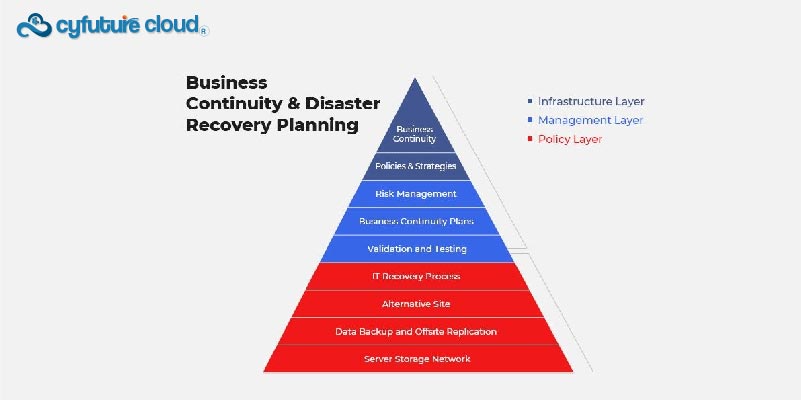Table of Contents
- An Introduction- Disaster Recovery
- What key roles does a disaster recovery solution fulfill?
- What are some examples of disaster recovery?
- What are Disaster Recovery Service Providers?
- Definition
- Importance of Disaster Recovery Service Providers
- Factors to Consider When Choosing a Disaster Recovery Service Provider
Whether it’s a ransomware attack, a natural disaster, or the corruption of a customer’s database, you want to ensure that your business’s IT system can recover. Therefore, it is imperative to have a business continuity and disaster recovery (BCDR) plan. Selecting the optimal BCDR solution for your business requirements is crucial, as there are numerous disaster recovery as a service providers options available, including cloud-based, hybrid, and on-premise options.
As a business owner, it’s essential to have a disaster recovery plan in place to ensure your company can continue operating in the event of an unforeseen catastrophe. Top disaster recovery companies can help with that.
In this post, we’ll explore what these providers do, key factors to consider when choosing one, and our top picks for the best disaster recovery service providers available today.
Let’s get started!
An Introduction- Disaster Recovery
In today’s fast-paced business environment, the necessity for robust Disaster Recovery Service Providers cannot be overstated. This guide delves into crucial criteria for selecting top-tier providers, with a specific emphasis on CDN services in India. Learn the nuances of ensuring business continuity and achieving seamless data recovery in the face of unforeseen disasters.
Businesses must be ready for disasters at all times to maintain operations. Disaster recovery services are crucial in minimizing downtime and protecting critical data. Choosing the right provider is key to ensuring that your business can quickly recover from any disaster.
Disaster recovery services are crucial in minimizing downtime and protecting critical data, and selecting the right provider is key to ensuring quick recovery from any disaster.
When selecting a disaster recovery service provider, there are several factors to consider. These include their experience, reputation, security measures, scalability of their solutions, and how they handle compliance issues.
The industry is currently flooded with well-known providers of catastrophe recovery services. Each has special qualities of its own that meet various demands and needs of businesses.
AWS, Microsoft Azure Site Recovery Services, and IBM Cloud Disaster Recovery Services are few top choices for the finest disaster recovery service providers. These providers offer a range of solutions that cater to different business needs and requirements, such as disaster recovery as a service (DRAAS), data protection, high availability, and disaster recovery planning.
With their experience, reputation, security measures, and scalability, these providers are trusted by businesses worldwide to minimize downtime and protect critical data. Choosing the correct disaster recovery service provider is crucial for maintaining business continuity and lessening the effects of upcoming calamities, regardless of the size of your company.
What key roles does a disaster recovery solution fulfill?
Disaster recovery solutions play a dual role: recovering data post-loss and ensuring business continuity. Business continuity planning ensures the smooth operation of critical processes during and after a crisis, with a central focus on restoring infrastructure, systems, and data. Delve into CDN services in India for efficient and seamless failover options within the Disaster Recovery as a Service (DRaaS) models.
Disaster recovery after data loss and business continuity planning are the two primary purposes of disaster recovery strategies. Even in the case of a natural disaster, business continuity planning guarantees that critical operations can carry on both during and after the crisis. Plans for disaster recovery center on restoring infrastructure, systems, and data to enable seamless failover.
DRaaS services are provided in numerous ways, including on-demand, based on usage, or through subscriptions. There are three primary models: self-service DRaaS, in which an organization manages its own DRaaS solution but depends on a vendor for cloud hosting and management software; managed DRaaS, in which the vendor assumes full responsibility for disaster management; and assisted DRaaS, which is a hybrid DRaaaS in which an organization chooses which aspects of disaster recovery or what data it wants to manage itself.
What are some examples of disaster recovery?
In the event of a system breakdown, disaster recovery solutions use three complementary data storage techniques to restore data. These techniques include backups, replication, and snapshots.
- Snapshots are locally stored images of a system taken at a particular moment in time that are used for file version restoration and version control.
- Making identical copies of data and logging each production change in the cloud is known as replication. Modifications are kept on a different website or system.
- Replicated files and snapshots that are copied to secondary storage make up backups. Traditionally, backups have been employed with image- and file-based recovery techniques for compliance and granular recovery.
What are Disaster Recovery Service Providers?
Disaster recovery service providers furnish businesses with the expertise and tools needed for efficient crisis recovery. CDN services in India play a pivotal role in crafting backup solutions, minimizing downtime, and ensuring business continuity. Explore comprehensive solutions like Acronis Disaster Recovery, featuring automated failover and cloud-based backups.
Disaster recovery service providers give companies the know-how and tools they need to bounce back from a crisis fast. These providers specialize in creating backup solutions that protect critical data, minimize downtime, and ensure business continuity. One example of a complete solution with automated failover for fast recovery times and cloud-based backups is Acronis Disaster Recovery.
Having access to the best disaster recovery service providers is crucial for any business owner concerned with protecting their company’s future. Backups are essential but don’t provide complete protection if there’s no plan or provider in place to help recover from disasters properly. With these experts on your side, you can have peace of mind knowing that your critical data is protected and your business will continue to operate even after an unexpected event occurs.
Definition
Providers of disaster recovery services provide a variety of solutions to aid companies in their recovery from calamities and safeguard vital information. These services may include backup solutions, data recovery tools, and cloud-based disaster recovery options. Acronis Disaster Recovery is one such solution that provides comprehensive protection against any type of disaster.
There are different types of disaster recovery services available, including cold site, warm site, and hot site solutions. Cold sites provide basic infrastructure but require significant setup time after a disaster. Warm sites contain some equipment that is already configured, but it still has to be configured further before it can be utilised. Hot sites are fully configured and ready to use immediately after a disaster.
While backup solutions can protect against data loss due to hardware failure or user error, they do not provide the same level of business continuity as a dedicated disaster recovery service provider. Disasters such as natural disasters or cyber attacks can cause extended downtime that requires specialized expertise for proper restoration – expertise which is provided by experienced providers like the best Disaster Recovery Service Providers for Business Continuity.

Importance of Disaster Recovery Service Providers
To guarantee continuity planning in the event of any unanticipated catastrophes, such as hardware failures, cyberattacks, or natural disasters, businesses require disaster recovery services. A reputable disaster recovery service provider can help businesses recover critical systems and minimize downtime efficiently. Disaster recovery helps protect critical business data by creating backup copies of important files that can be restored quickly if necessary.
When choosing a disaster recovery service provider, it is essential to consider factors such as their experience in the industry, reliability of their solutions, and the level of support they offer during an emergency. Acronis Disaster Recovery is one solution that offers reliable and comprehensive backup options for businesses looking for peace of mind when it comes to securing their data. Ultimately, partnering with the best disaster recovery service providers ensures that your business remains operational even in times of crisis while maintaining customer trust and loyalty through uninterrupted services.
Factors to Consider When Choosing a Disaster Recovery Service Provider
When choosing a disaster recovery service provider, it is important to consider their expertise and experience. Look for providers with a proven track record in handling disasters similar to the ones your business may face. Additionally, make sure that they have the necessary technical skills and resources to ensure quick recovery and minimal downtime.
Another factor to consider is the reputation and trustworthiness of the service provider. Check for customer reviews, case studies, and industry certifications that demonstrate their reliability. It’s also important to ensure that they have transparent communication channels throughout the disaster recovery process so you can be kept informed every step of the way.
1. Expertise and Experience
Our team of disaster recovery service providers has a proven track record of helping businesses ensure business continuity, protect critical data, and reduce downtime. With industry-specific expertise and years of experience in disaster recovery services, we have the technical proficiency to develop customized solutions that fit your unique needs.
Key areas where our expertise and experience shines include:
- Industry-specific knowledge to provide tailored solutions for different business sectors
- Having good years of experience in delivering successful disaster recovery services
- Technical proficiency to implement the latest technologies for efficient backup and restoration
2. Reputation and Trustworthiness
Client references and testimonials are the key indicators of a reliable disaster recovery service provider. It is important to review these references before making any commitments, as they provide valuable insight into the level of service and support that can be expected. In addition, certifications and awards received from industry associations further prove the credibility of a provider.
Establishing confidence with prospective consumers also requires being transparent about catastrophe recovery procedures. Reputable providers should offer clear explanations of their processes, including backup procedures, recovery time objectives (RTOs), and communication protocols during an outage. This level of transparency demonstrates a commitment to providing high-quality services while minimizing downtime in case of emergency situations.
3. Flexibility and Customizability
Our disaster recovery service providers offer a high level of flexibility and customizability to meet the unique needs of our clients. Our solutions are tailored specifically to each client’s requirements, ensuring that they receive the most effective solution possible. Clients can select the service level that best fits their needs and budget from a variety of options, including standard and premium packages.
Scalability is also an essential aspect of our services since businesses’ growth or changes require adjustments to be made in response. As a result, we guarantee that none of our solutions will sacrifice effectiveness or quality in order to support the expansion of your company. Because we prioritise adaptability, you can rest easy knowing that your disaster recovery plan will change as your company does.
4. Security and Compliance
Our disaster recovery service providers prioritize security and compliance to ensure the protection of critical data in case of natural disasters or cyber attacks. Compliance with regulatory standards, such as HIPAA and GDPR, is integral to our approach in safeguarding data privacy.
We use a “defence in depth” approach that combines network segmentation for isolation, encryption, and access control mechanisms like multi-factor authentication to offer strong defence against possible threats. We also have redundancy protocols in place for offsite backup data centres that are only accessible by authorised staff.
- Compliance with regulatory standards (e.g., HIPAA, GDPR)
- A defense-in-depth strategy for security features like access control and encryption
- Redundancy procedures for backup data centres in the event of cyberattacks or natural catastrophes
5. Cost and Value
Our disaster recovery services offer a transparent pricing structure with no hidden fees. We understand that our clients need to know exactly what they are paying for and ensure that all costs are disclosed upfront. In addition, we guarantee the service level agreement (SLA) to provide peace of mind and demonstrate our commitment to delivering quality service.
At the same time, we recognize the importance of providing cost-effective plans without sacrificing quality or reliability. Our services come in various packages tailored to different business needs and budgets. This makes premium catastrophe recovery solutions available to companies of all sizes at a reasonable cost.
Recent Post
Send this to a friend

 Server
Colocation
Server
Colocation CDN
Network
CDN
Network Linux
Cloud Hosting
Linux
Cloud Hosting Kubernetes
Kubernetes Pricing
Calculator
Pricing
Calculator
 Power
Power
 Utilities
Utilities VMware
Private Cloud
VMware
Private Cloud VMware
on AWS
VMware
on AWS VMware
on Azure
VMware
on Azure Service
Level Agreement
Service
Level Agreement 




















